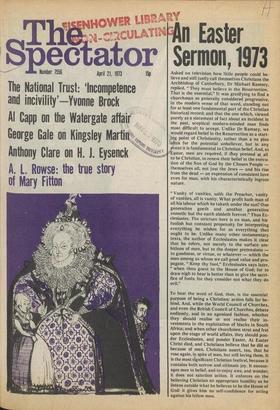n Easter Sermon, 1913
Asked on television how little people could believe and still justly call themselves Christians the Archbishop of Canterbury, Dr Michael Ramsey, replied, "They must believe in the Resurrection. That is the essential." It was gratifying to find a churchman so generally considered progressive, in the modern sense of that word, standing out for at least one fundamental part of the Christian historical record; and that the one which, viewed purely as a statement of fact about an incident in the past, sceptical modern-minded man finds most difficult to accept. Unlike Dr Ramsey, we would regard belief in the Resurrection as a starting point of Christianity, rather than a ne plus ultra for the potential unbeliever, but in any ent it is fundamental to Christian belief. And, at aster, men are required, if they pretend at all to be Christian, to renew their belief in the execution of the Son of God by the Chosen People — themselves all, not just the Jews — and his rise from the dead — an expression of consistent love even for man, with his characteristically ingrate nature.
"Vanity of vanities, saith the Preacher, vanity of vanities, all is vanity. What profit hath man of all his labour which he taketh under the sun? One generation goeth and another generation cometh: but the earth abideth forever." Thus Ecclesiastes. The stricture -here is on man, and his foolish but constant propensity for interpreting everything he wishes for as everything that ought to be. Unlike many other testamentary texts, the author of Ecclesiastes makes it clear that he refers, not merely to the surface ambitions of man, but to the deeper pretensions — to goodness, or virtue, or whatever — which the men among us whom we call good value and propagate. " Keep thy foot," Ecclesiastes says later, "when thou goest to the House of God; for to draw nigh to hear is better than to give the sacrifice of fools: for they consider not what they do evil."
To hear the word of God, then, is the essential purpose of being a Christian: action falls far be hind. And, while the World Council of Churches, and even the British Council of Churches, debate endlessly, and in an agonised fashion, whether they should realise or not realise their investments in the exploitation of blacks in South Africa; and when other churchmen strut and fret upon the stage of world affairs, they should ponder Ecclesiastes, and ponder Easter. At Easter Christ died, and Christians believe that he did so because of men. Christians assert, too, that he rose again, in spite of men, but still loving them. It is the most significant Christian festival, because it contains both sorrow and ultimate joy. It encourages men to belief, and to enjoy awe, and wonder; it does not sanction action. It enforces on the believing Christian an appropriate humility as he listens outside what he believes to be the House of God: it gives him no self-confidence for acting against his fellow men.


































